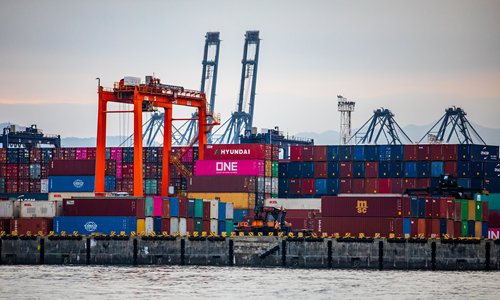Shenzhen Yantian port and Hong Kong ports can achieve growth in more cooperation: experts

Cargo containers are piled up at the Yantian port in Shenzhen, South China's Guangdong Province. Photo: VCG
Each port in the Greater Bay Area should achieve differentiated management, avoid price underpricing, and learn from and promote each other in terms of technical level and management experience, experts said, calling for greater exchanges and cooperation between the ports in Shenzhen and the Hong Kong Special Administrative Region (HKSAR) in a bid to achieve a greater prosperity for the region.This remark came after Shenzhen Yantian port takes the lead in throughput amid the rising demand for Chinese products and the market as the country has realized a fast recovery from the fallout of the pandemic, despite the global outbreak continues.
In order to cope with the coming Christmas sales season, retail giants such as Wal-Mart and Amazon actively stock up and buy basic life materials and personal protective goods and many foreign trade enterprises aim at this export market and continue to expand their export volume, Shenzhen News reported.
The monthly throughput of Yantian Port in Shenzhen, South China's Guangdong Province, exceeded 1.46 million transmission extension units in September, breaking the record of throughput in the world, according to the customs' report.
The expansion of Yantian port's throughput reflects the expansion of China's foreign trade, which is also the result of China's rapid resumption of work and production. In addition, the volume of China's foreign trade shifting from entrepot trade to direct trade is increasing, which also leads to the increase of the cargo volume on the port, Li Youhuan, a senior economist at the Guangdong Academy of Social Sciences, told the Global Times on Wednesday.
Experts said that the achievement in the Shenzhen port is also a reflection of the growing economic development of the Greater Bay Area and further outcome is expected if the ports in the region can further cooperate in technology and management.
Yantian Port has a high intelligence capability with the daily business of the port, such as container allocation, has been adapted with highly intelligent and automated elements that some even have realized unmanned operation, which greatly reduces the operation cost and improves the efficiency, Li said, adding that the Hong Kong port also has its advantages in experiences that both sides can share.
Li said that the port in Shenzhen and the one in Hong Kong can have greater outcome if each port in this region can achieve differentiated management, avoid mutual price pressure, learn from and promote each other in terms of technology level and management experience.
According to the statistics of vessels, port cargoes and containers for the second quarter of 2020 released by the HKSAR government, the throughput of Hong Kong port cargoes in the second quarter fell by 2.7 percent year-on-year to 67.5 million tonnes.
"The turmoil and epidemic in Hong Kong have an impact on the economy, and if we rely solely on Hong Kong, we will certainly not be able to meet the current growing demand," said Hong Tao, director of the Institute of Business Economics at Beijing Technology and Business University.


